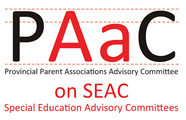Under standard 1 of the Standards for School Boards’ Special Education Plans (2000) the school board is expected to consult the public about the Special Education Plan and proposed changes.
Effective Practices to promote public consultation on the Special Education Plan include:
- Providing an e-mail address or other mechanism for parents and members of the public to comment on the Special Education Plan.
- Promoting the opportunity for public consultation on the school board website.
- Holding community meetings to provide presentations on the Special Education Plan and/or proposed changes to special education programs and services.
- Conducting a survey of parents/guardians of students with an Individual Education Plan (IEP) about the special education programs and services.
One of the key goals of the Ministry of Education is “public confidence in education” and parent engagement in the school system is an important component. There is considerable evidence to show that parent engagement contributes to student success. SEAC has an important role to play in supporting parents of students with special education needs to be engaged in the school system.
As discussed in Section 3.5, SEAC can support the development of information about special education, including in the Special Education Plan and Parent Guides, that is easy to understand and readily accessible to families. SEAC also has an important role in public consultations about special education and changes in programs and services. PAAC on SEAC recommends that SEAC members work with the school board staff to increase awareness of SEAC and its role as an advisory committee to the Trustees.
SEAC is a standing committee of the school board and the meetings of SEAC are open to the public. The school board is responsible to provide access by holding the meetings in a location that can accommodate the public and by making information about the meetings available. Typically, the time and date of meetings is posted on the school board’s website.
PAAC on SEAC observes that public awareness of SEAC is generally quite poor and only a small percentage of parents of students with special education needs are aware of SEAC or the important role that SEAC plays in special education. Increased public awareness of SEAC is also necessary in order to attract and recruit new members.
Effective Practices to increase awareness of SEAC include:
- Providing information on dates, time and location of SEAC meetings on the school board website.
- Posting Minutes and meeting highlights on the school board website.
- Providing an up-to-date list of SEAC members, and contact information (with member consent), on the school board website.
- Providing information on the role of SEAC members and how they can help parents.
- Providing links to the SEAC section of the school board website from student and parent portals.
- Providing a live webcast of SEAC meetings, as some school boards do for their meetings of the Trustees.
- Moving the location of meetings to different schools and inviting members of school councils or other parent groups to attend the SEAC session.
- Developing a SEAC brochure and providing copies to all students with special education needs.
- Featuring stories or events related to SEAC on the opening page of the school board website.
The Ministry of Education has reconfirmed the commitment to parent engagement in education with the release in September 2010 of a new Parent Engagement Policy. SEACs are an example of effective parent engagement.
Effective practices to enhance parent engagement in special education include:
- Having cross representation between SEAC and the Parent Involvement Committees (PIC) through common membership, with a member of SEAC also being appointed as a member of PIC.
- Sharing copies of PIC and SEAC Minutes or developing a process to share meeting highlights through the committee Chairs.
- Inviting PIC members and members of School Councils to public consultations about special education.
- Making presentations to PIC members on an annual or regular basis about SEAC, special education and annual planning for special education programs and services.
- Requesting PIC help to organize, or hold, joint workshops or parent conferences.
- Requesting PIC members, and School Council Chairs, to share important information about SEAC or special education with families.
All school boards have a Parent Involvement Committee (PIC) and every school has a School Council. Both PICs and school councils have been developed to foster parent engagement by providing information to parents and inviting their input to school and board activities. PAAC on SEAC recommends that SEAC have a strong connection with PICs and School Councils to strengthen parent engagement in special education.
